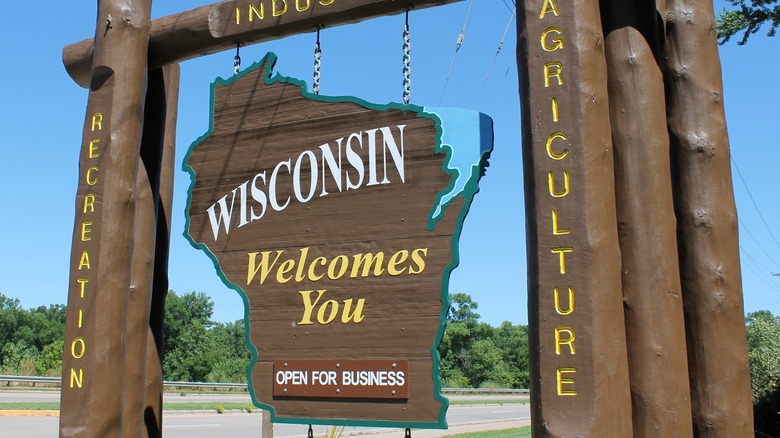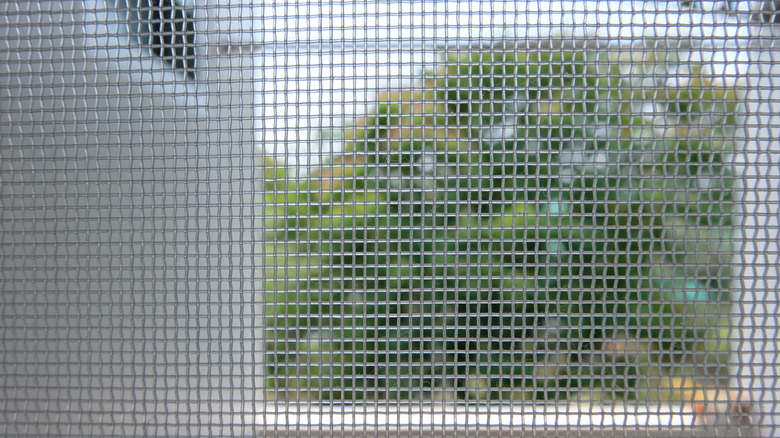Weirdest Laws In Wisconsin
Wisconsin is a Midwestern state that sits in the heart of the Great Lakes region. It borders the states of Minnesota, Illinois, Iowa, and Michigan, and also shares an international maritime border with Canada. The state is known for producing most of America's dairy products, such as cheese and once upon a time, milk (via NPR). As a result, it earned the nickname "America's Dairyland."
The territory joined the union in 1848 and became the 30th state, per Wisconsin History. Today it is known for being one of several states with a lot of lakes (per Lake Homes) It produces most of the ginseng sold in the country (Travel Wisconsin), and it adopted the polka as the state dance, thanks to Germans once being the largest immigrant group (via Wisconsin Dept. of Administration).
Similar to many other states, Wisconsin has its own set of laws they govern by. And a fair share of them are, albeit, weird.
Dining in Wisconsin
If you have plans on visiting the Dairyland state and eventually dining there, be alert about a weird law, coincidentally, related to how some dairy products are served. According to the Wisconsin State Legislature, serving margarine in restaurants comes with a lot of stipulations. Unless you specifically ask for margarine while eating somewhere in Wisconsin, servers cannot serve it to you. It also can't be served in schools, hospitals, or prisons unless the use is deemed necessary.
Apparently since some forms of margarine are non-dairy, and it's often used as an alternative to butter, the state wants to set the record straight to avoid confusing anyone. Punishments for serving margarine in Wisconsin without customer request can be a fine and imprisonment. The state's love-hate relationship with margarine goes back decades, and apparently it was banned up until 1967, per Volume One. While it is weird, it's only fitting that the state that prides itself on dairy is not a fan of dairy imitation.
Wisconsin's high cheese standards
One upping their love for dairy, Wisconsin takes no prisoners when it comes to cheese-making. According to the Agricultural Marketing Resource, the state makes more cheese than any other state and has held that spot for years. So you'd imagine that the state that produces 26% of the country's cheese supply has a specific standard for making the popular dairy product. And boy do they, because it's pretty weird, too.
Per Wisconsin State Legislature, there shall be no cheese given an AA grade if it lacks the ability to please. To get an AA grade for your cheese production in the state, it must be considered "highly pleasing." And even weirder, this designation seems to mostly apply to the creation of Colby and Monterey jack cheeses. But there are a variety of other cheeses that have to meet certain standards. By definition, highly pleasing means cheese that doesn't smell or taste bad, which, of course, means it shouldn't be made to stink or with an odd flavor on purpose. Wisconsin seems to emphasize the nuances to cheese-making, and there are other letter grades such as A or B that come with different requirements, such as the latter grade allowing for cheese that is "fairly pleasing."
Who has the right of way in Wisconsin?
Oftentimes, you'll see viral videos of people letting different types of animals cross the road. Because, of course, humanity has built these modern things around them, and they're just trying to get around; rules of the road don't apply to them. Yet, this act of kindness is courtesy. A driver doesn't have to stop to let an animal cross, but many people will, while others might drive around.
In Wisconsin, however, stopping for an animal is not optional, as there is a law that you have to (per Wisconsin State Legislature). So if you see an animal when you're driving along the road in Wisconsin, you must give them the right-of-way. This mostly applies to livestock animals, such as cows, pigs, sheep, and sometimes deer. Any animal that likely lives on a nearby farm has the right-of-way on Wisconsin roads. The state maintains that farmers can allow their animals to roam, but have to ensure they're properly overseeing them and that roads are shared.
No love for snowballs
A decades-old law on the books has banned snowball throwing in many cities and towns in Wisconsin. The city of Wausau in particular made headlines in 2019, when the weird law that criminalized throwing snowballs on public property gained some national attention (via USA Today).
Throwing a snowball had been banned in Wausau since 1962, and it was created to protect public safety. In the years since the law was passed, people were rarely punished for it. Yet, when the law started getting attention a few years ago, it was because the city was ready to do away with the law. The city's police chief and mayor even had to come out to demonstrate that snowballs were indeed now welcome after a years-long ban. However, while new law-wording omits mention of snowballs, per Wausau Daily Herald, it clearly only applies to public property — not private. So you might still get in trouble.
Several other Wisconsin cities have similar laws. Antigo, Marshfield, Merrill, Rib Mountain, Schofield, and Weston still have snowball banning laws on the books (via Route Fifty). Even weirder, a lot of city officials in these cities aren't always aware such a law exists.
Screen your windows
If you're thinking of enjoying any form of outdoorsy air as natural as you can, from the comfort of being indoors, then you should definitely think twice if it's in the Wisconsin city of Hudson. The coastal city, which borders Minnesota, has a very specific law regarding window screens. Per Ecode, the city requires that every dwelling have screens installed in all windows between May 1 and October 1. The law comes across as a public safety concern because apparently it's meant to curb mosquitoes and other flying and non-flying insects from entering indoor spaces. It's quite a weird law if perhaps you actually enjoy having a nature encounter with a bug. Or maybe you just want to take in a view without the interference of a screen blocking you.
Luckily, it's not a year-round law. So from October 2 to April 30, screen-free windows are a go!





